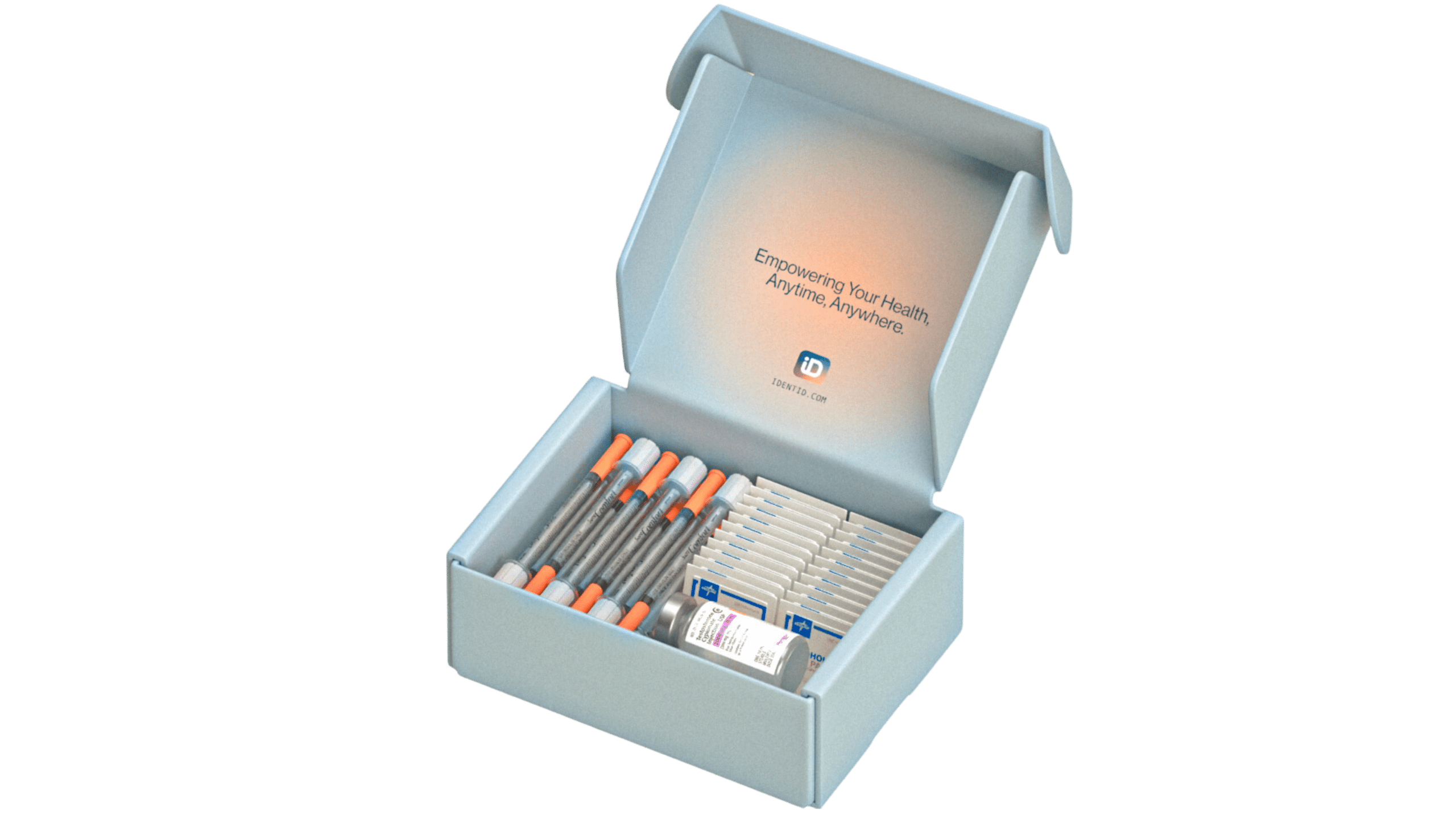Compounded Tirzepatide
Compounding is the process of preparing a prescription drug that meets the specific needs of an individual patient. Pharmacies are permitted to compound medications that are listed on the FDA’s drug shortage list.
Tirzepatide is a medication classified as a GLP-1 and GIP dual-receptor agonist that helps manage type 2 diabetes and supports weight loss by regulating blood sugar and controlling appetite. It is known by its brand names Mounjaro or Zepbound. We have partnered with a pharmacy that offers compounded Tirzepatide to our patients.
IdentID works with state-licensed compounding pharmacies to produce Compounded Tirzepatide. Compounding is regulated by both FDA and state boards of pharmacy. A licensed compounding pharmacy must comply with both federal and state laws, which include administrative requirements and quality standards.
Our partner, “Belmar Pharma Solutions” is a compounding pharmacy that strictly adheres to industry regulations set by state boards of pharmacy, the FDA, and the DEA. They ensure the safety and quality of their ingredients and compounded medications, complying with USP <795> guidelines for non- sterile compounding. They also meet USP <800> standards for handling hazardous drugs, safeguarding our pharmacy personnel and environment. Their internal policies go beyond regulatory requirements, with rigorous testing conducted by an independent lab from sourcing to distribution. This commitment ensures the highest level of safety, accuracy, and quality for their compounded medications.
Tirzepatide works by mimicking the action of a hormone called glucagon-like peptide-1 (GLP-1). This hormone is naturally produced in your gut after you eat and has several important effects: it stimulates insulin production, which helps lower blood sugar, reduces the amount of sugar your liver makes, and it slows down digestion, which helps control appetite and calorie intake. It also activates another hormone called gastric inhibitory polypeptide (GIP). This dual action is like having an extra tool in your toolkit. GIP complements the effects of GLP-1, enhancing insulin release and also playing a role in managing how your body stores fat. This combined approach helps improve blood sugar levels more effectively and promotes more significant weight loss compared to drugs that target only the GLP-1 receptor.
For weight loss, the suggested beginning dose is 2.5 mg once weekly for four weeks. You can then increase the dose every four weeks until you reach a dose where you can continue to lose weight without experiencing negative side effects. We offer up to 15 mg/week dosing. You can take Compounded Tirzepatide at any time throughout the day without regards to meals.
Compounded Tirzepatide is given via a subcutaneous injected, meaning it is injected under the skin into the thigh, abdomen, or upper arm (2)
Commonly experienced side effects with Compounded Tirzepatide include:
- Nausea
- Vomiting
- Diarrhea
- Constipation
- Dizziness
- Low blood sugar
- Tiredness
- Stomach pain
- Burping
- Gas
- Heartburn
Certain individuals should not take Compounded Semaglutide. Therefore, it is important to let your doctor know of your full medical history. In particular, the following conditions may affect your ability to take Compounded Semaglutide:
Allergy to Compounded Semaglutide or its components
Multiple endocrine neoplasia syndrome or medullary thyroid carcinoma (2)
If you have gastric motility problems or delayed emptying
Compounded drugs can be prescribed under federal law, though they are not specifically FDA-approved. Unlike standard medications, compounded drugs do not undergo the same FDA reviews for safety, effectiveness, or manufacturing. However, compounding pharmacies that follow strict regulations set by the state boards of pharmacy, FDA, and DEA are permitted to compound certain medications under the Drug Quality and Security Act (DQSA). This includes popular weight loss ingredients like Semaglutide and Tirzepatide, which meet federal guidelines for use.
The FDA permits compounding pharmacies to make compounded medications under specific circumstances, primarily outlined by the Drug Quality and Security Act (DQSA). Compounding is allowed when:
Patient-Specific Needs: Compounded medications are
created based on a prescription for an individual patient,
often because commercially available drugs don’t meet
specific needs (e.g., different dosage, allergen-freeformulation).
Shortages or Unavailability: The FDA allows compounding if the
commercially available medication is in shortage or temporarily unavailable.
Regulatory Compliance: Compounding pharmacies must followregulations set by state boards of pharmacy and adhere to federal guidelines for quality, including using FDA-approved active ingredients. Compounding must be done under the framework of either Section 503A (traditional compounding pharmacies) or Section 503B (outsourcing facilities) of the Federal Food, Drug, and Cosmetic Act.
In short, compounded medications are not FDA-approved, but they are
permitted as long as these guidelines are followed and are subject to
oversight to ensure safety and quality.
Brand-name weight loss medications can be costly, often ranging from $1,000 to $1,500 out-of-pocket when insurance doesn’t cover them or requires a high co-pay. To make treatment more accessible, we’ve created programs that are both affordable and personalized to your unique needs.
Compounded Tirzepatide starts $349 for new patients for the first three months of treatment. Pricing may vary if you are already taking Tirzepatide at a higher dosage prior to switching to our services or for patients who wish to stay on a maintenance dose after their initial three months promotional offer. Pricing per dose of Tirzepatide is $379/month for 2.5 mg, $419/month for 5 mg, $459 for 7.5mg, $499/month for 10 mg and $599/month for 12.5 mg and $699/month for 15 mg.

